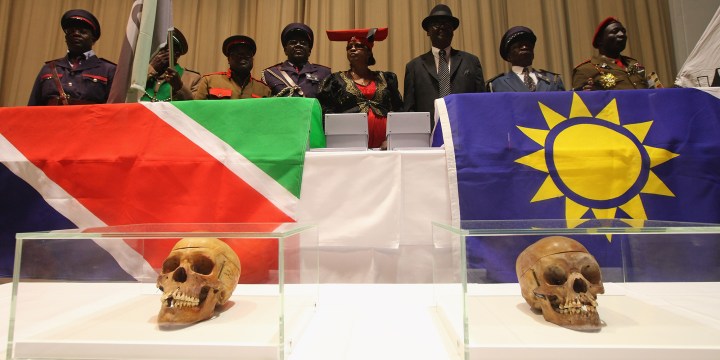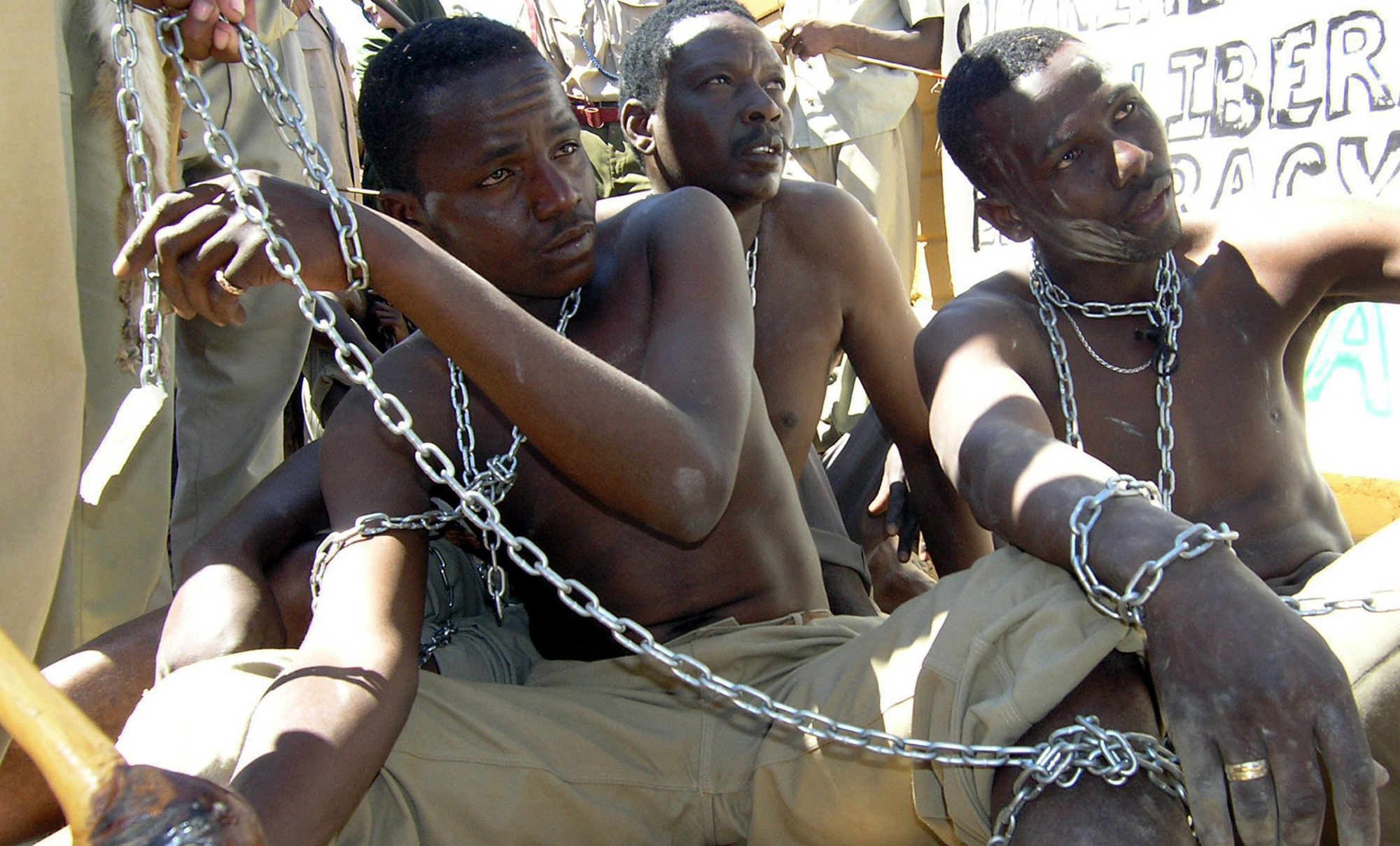COLONIALISM RELOADED OP-ED
The German-Namibian ‘Reconciliation Agreement’ should not be agreed to

Critics refer to the insultingly small amount Germany is willing to offer as financial compensation, while avoiding the term reparation and a recognition of genocide in legal terms. Another bone of contention is the exclusion of significant agencies of the descendants of the most affected communities.
The so-called “Reconciliation Agreement” negotiated by the German and Namibian governments and initialled in May 2021 was seen as a remarkable effort to come to terms with their shared colonial past. But it has met stumbling blocks and awaits ratification.
After growing dissatisfaction in Namibia and a change in government in Germany, speculation was ripe that the agreement might be re-negotiated to meet at least some of the criticism. A government answer to a question tabled in the German parliament has now clarified in no uncertain terms that this will not be the case: it is this agreement or none.
It remains to be seen how the Namibian side responds after all the domestic protest by those feeling excluded and even humiliated by the negotiated result. Frustration was also expressed by leading politicians of the governing South West Africa People’s Organisation (Swapo), who felt that the financial compensation was insufficient. The government now faces a tough decision of taking it or leaving it.

A Namibian skull from the German Empire’s murderous campaign in 1904-1908 which saw the colonisers kill an estimated 60,000 Ovaherero and 10,000 Nama people after they rose up against colonial rule, considered the first genocide of the 20th century, is seen during a repatriation ceremony at the Franzoesische Friedrichstadtkirche (French Cathedral) on Gendarmenmarkt on 29 August 2018 in Berlin, Germany. (Photo: Adam Berry / Getty Images)
The Reconciliation Agreement
In mid-2015, Germany admitted that the extermination of the Ovaherero, Nama, Damara and San was genocide. Special envoys subsequently negotiated how to come to terms with this past. After a total of nine meetings, they initialled a “Joint Declaration” in May 2021.
With the flowery subtitle “United in Remembrance of Our Colonial Past, United in Our Will to Reconcile, United in Our Vision of the Future”, it was dubbed the “Reconciliation Agreement”. The result has been at the centre of controversies. Criticism has been published among others in The Conversation here and here.
Critics refer to the insultingly small amount Germany is willing to offer as financial compensation while avoiding the term reparation and recognition of genocide in legal terms. Another bone of contention is the exclusion of significant agencies of the descendants of the most affected communities.
Read more in Daily Maverick: “Germany-Namibia landmark accord: Negotiating the price tag of redemption for colonial genocide”
The state-to-state agreement degrades the people of Namibia to mere rubber-stamping by a classical Schlussstrich (final line) formula:
“Germany apologises and bows before the descendants of the victims. … The Namibian Government and people accept Germany’s apology and believe that it paves the way to a lasting mutual understanding and the consolidation of a special relationship between the two nations.”
Namibian dissent
The disagreement manifested in Namibia’s National Assembly debate from the end of September until 1 December 2021. Deputy Minister Esther Muinjangue set the tone. As the only non-Swapo member of government, she declared: “We have the feeling our government is not supporting us. You hear government-to-government, but where are we?”
Leader of the official opposition, MacHenry Venaani, lambasted the agreed compensation for the crimes committed as a flagrant display of arrogance by the German government lacking empathy. Bernadus Swartbooi, leader of the second biggest opposition party, concluded that “this nation-state does not belong to all”.
Visit Daily Maverick’s home page for more news, analysis and investigations
In direct contradiction to its name, the Reconciliation Agreement entrenched ethnic divisions. As Minister Tom Alweendo declared:
“It is now so apparent that the debate has become so divisive. We call each other names. We refer to each other as puppets and sell-outs… should we continue with this path, then the legacy left by the divide-and-rule philosophy will continue to flourish.”
The parliamentary debate closed without any decision taken. Government announced that taking into consideration the contributions, it will seek further negotiations with the German side. Esther Muinjangue added in an interview that “as long as Germany avoids using words such as genocide and reparation, we can forget about coming closer to closing this chapter. We need to go back to the drawing board.”
In May 2022 Namibia’s first president Sam Nujoma joined the critics. The influential elder statesman declared that “Namibia must return to the negotiating table with Germany, whose offer of N$18.4-billion (R18.4-billion) for the Nama and Ovaherero genocide is woefully insignificant.”
No renegotiations
In October 2021, the German special envoy Ruprecht Polenz had already confirmed that the Joint Declaration was a closed case. But in December a new government was formed by the Social Democratic, Green and Liberal Parties.
It replaced the big coalition of Social Democrats and the Christian Democratic Union.
The Social Democratic Foreign Minister Heiko Maas was succeeded by Annalena Baerbock of the Green Party. The coalition agreement stresses reconciliation with Namibia as an “indispensable task”. The draft agreement is mentioned as a potential prelude to a further common processing.
But in January 2022 a spokesperson for the German Foreign Ministry maintained that the offer is final. This has now been confirmed. With surprising clarity, the German government responded on 31 August 2022 to a parliamentary question by the Left Party. It stated in no uncertain terms that Germany will not enter any renegotiations. Only technicalities of its implementation will be clarified after its ratification.
Reconciliation without Wiedergutmachung?
As already pointed out in 1993 by American lawyer Lynn Berat, the International Military Tribunal at Nuremberg had stressed retroactivity as an essential notion. German liability as appropriate measure for redress required reparations for the Holocaust.
In a similar vein, the genocide scholars Howard Rechavia-Taylor and Dirk Moses argue that “the Herero and Nama genocide and its aftermath are by no means identical to the Holocaust and its aftermath, but that does not rule out comparisons about the seriousness with which the question of reparations has been dealt.”
Without the descendants of the genocide survivors substantially involved and willing to reconcile, the outcome of the bilateral German-Namibian negotiations remains as patronising and paternalistic as colonialism had been. It underlines the continued colonial asymmetries.
As German Professor in International Law Matthias Goldmann observed:
“The proposal to use the term ‘healing the wounds’ suggests that it is not. …
“We need to stop using lukewarm legal arguments as an excuse against deeper forms of solidarity. … Of course, such bonds of solidarity are going to hurt some of our interests and sensitivities. Not just financially. But if it does not hurt, it is not a fix.”
Take it or leave it?
Given the current fiscal crisis, the Namibian government might be tempted to swallow the toad to receive at least a small financial injection into the ailing local economy. After all, the German government has in its reply confirmed that a budgetary allocation is already making provisions for a first transfer of money to implement projects.
But given the overwhelming criticism at home, such willingness to give in might further erode the popularity of Swapo as the party in government.
Beyond political pragmatism, there remains a more fundamental aspect to the current impasse: Germany acts from a continued position of power, or rather exercises the arrogance of power, by categorically stating either this or nothing at all.

A performance shows the treatment of Hereros in 1904 at a ceremony commemorating the killing of thousands of Hereros by German troops, at Okakarara, 250 km northwest of Windhoek, Namibia, Saturday 14 August 2004. (Photo: EPA / Wiebke Gebert)
This underlines the continued colonial asymmetry in state-to-state relations and is nothing less than patronising and an insult. It is a far cry from a partner dialogue based on equality.
Given this situation, Namibia’s government is faced with the unpleasant choice of being between the devil and the deep blue sea. But if national pride is a relevant reference point, the decision should be clear. The so-called reconciliation agreement is a far cry from any meaningful reconciliation and is a thinly disguised continuation of the colonial hierarchy.
The Jewish historian Yosef Hayim Yerushalmi (1932-2009) suggested in his book Zakhor that the opposite of forgetting is not remembering, but justice. Retributive justice is indeed a term missing from the vocabulary.
For the sake of justice, this so-called “Reconciliation Agreement” should not be ratified. Otherwise, once again and as so often in history, the beneficiaries of the crimes committed get away with murder. DM
Prof Henning Melber is an Associate at the Nordic Africa Institute in Uppsala, Extraordinary Professor at the University of Pretoria and the University of the Free State, and Senior Research Fellow with the Institute for Commonwealth Studies/Centre for Advanced Study at the University of London. He came as a son of emigrants from West Germany to Namibia in 1967, where he joined Swapo in 1974.




















 Become an Insider
Become an Insider
Comments - Please login in order to comment.